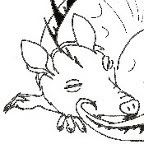 Daisy Fay and the Miracle Man
Daisy Fay and the Miracle Manby Fannie Flagg
I love this book.
I first read it—well, I really can't remember. I think it may have been a gift from an aunt, but after I read it, I wondered if she knew what was in it? Who knows? Who cares? The point is, I've read it and re-read it since, and I really can't imagine my life without this book.
It's funny. Very. And not in a silly way, but in a truly witty and fun way. The book is composed entirely of journal entries written by Miss Daisy Fay Harper (stop yawning—yes, journal-entry books can be dull, but this is anything but, I promise), beginning when she is age 11 until she is age 18. Set in the 50s in Mississippi, Daisy Fay is brutally honest about the people around her (and sometimes naive), but always, always funny. Her family is a bit of a mess, and her life is a bit of a mess, but there isn't a dull sentence in this book. Frequently it is touching and sad, but always true.
I can't even give a specific example, because I don't want to spoil anything in this book. I wish I could. I wish I could say something about...I can't. I can't! I won't spoil it! But it always makes me feel much better after I've read it, and the ending is fantastic (which, of course, doesn't mean that all the stuff in the middle isn't, it's just that after everything that has happened to her, the ending is very satisfying).









